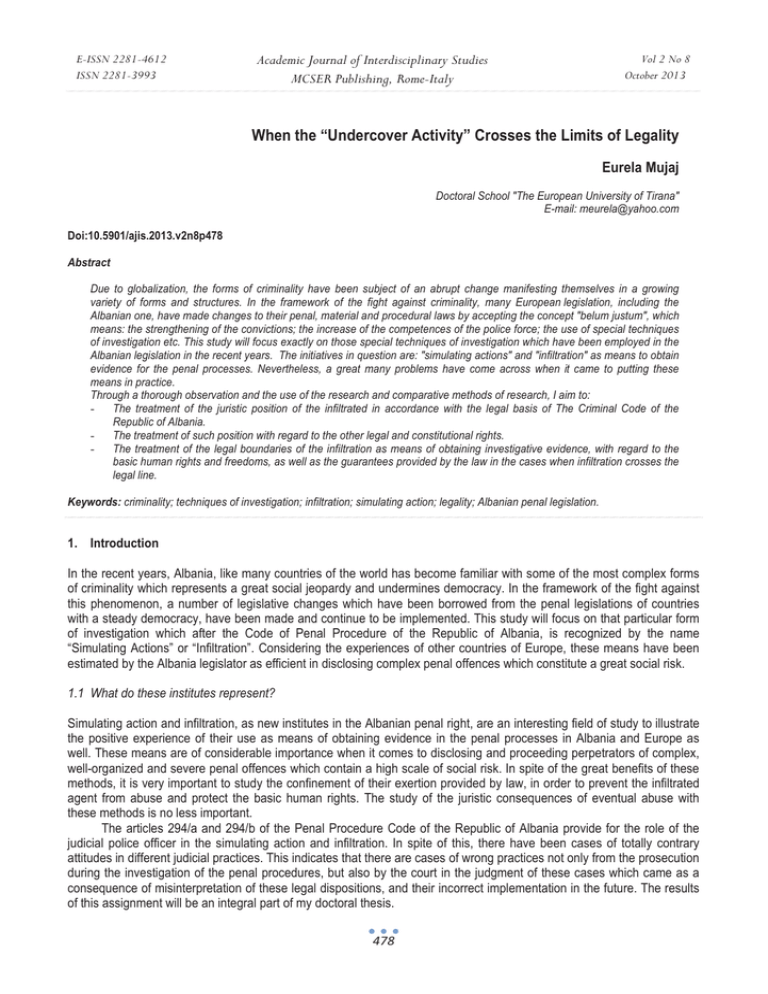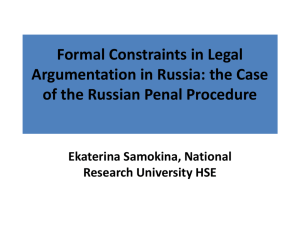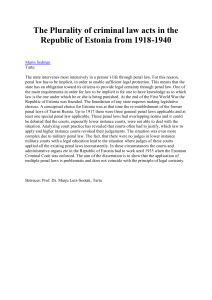When the “Undercover Activity” Crosses the Limits of Legality Eurela Mujaj
advertisement

E-ISSN 2281-4612 ISSN 2281-3993 Academic Journal of Interdisciplinary Studies MCSER Publishing, Rome-Italy Vol 2 No 8 October 2013 When the “Undercover Activity” Crosses the Limits of Legality Eurela Mujaj Doctoral School "The European University of Tirana" E-mail: meurela@yahoo.com Doi:10.5901/ajis.2013.v2n8p478 Abstract Due to globalization, the forms of criminality have been subject of an abrupt change manifesting themselves in a growing variety of forms and structures. In the framework of the fight against criminality, many European legislation, including the Albanian one, have made changes to their penal, material and procedural laws by accepting the concept "belum justum", which means: the strengthening of the convictions; the increase of the competences of the police force; the use of special techniques of investigation etc. This study will focus exactly on those special techniques of investigation which have been employed in the Albanian legislation in the recent years. The initiatives in question are: "simulating actions" and "infiltration" as means to obtain evidence for the penal processes. Nevertheless, a great many problems have come across when it came to putting these means in practice. Through a thorough observation and the use of the research and comparative methods of research, I aim to: - The treatment of the juristic position of the infiltrated in accordance with the legal basis of The Criminal Code of the Republic of Albania. - The treatment of such position with regard to the other legal and constitutional rights. - The treatment of the legal boundaries of the infiltration as means of obtaining investigative evidence, with regard to the basic human rights and freedoms, as well as the guarantees provided by the law in the cases when infiltration crosses the legal line. Keywords: criminality; techniques of investigation; infiltration; simulating action; legality; Albanian penal legislation. 1. Introduction In the recent years, Albania, like many countries of the world has become familiar with some of the most complex forms of criminality which represents a great social jeopardy and undermines democracy. In the framework of the fight against this phenomenon, a number of legislative changes which have been borrowed from the penal legislations of countries with a steady democracy, have been made and continue to be implemented. This study will focus on that particular form of investigation which after the Code of Penal Procedure of the Republic of Albania, is recognized by the name “Simulating Actions” or “Infiltration”. Considering the experiences of other countries of Europe, these means have been estimated by the Albania legislator as efficient in disclosing complex penal offences which constitute a great social risk. 1.1 What do these institutes represent? Simulating action and infiltration, as new institutes in the Albanian penal right, are an interesting field of study to illustrate the positive experience of their use as means of obtaining evidence in the penal processes in Albania and Europe as well. These means are of considerable importance when it comes to disclosing and proceeding perpetrators of complex, well-organized and severe penal offences which contain a high scale of social risk. In spite of the great benefits of these methods, it is very important to study the confinement of their exertion provided by law, in order to prevent the infiltrated agent from abuse and protect the basic human rights. The study of the juristic consequences of eventual abuse with these methods is no less important. The articles 294/a and 294/b of the Penal Procedure Code of the Republic of Albania provide for the role of the judicial police officer in the simulating action and infiltration. In spite of this, there have been cases of totally contrary attitudes in different judicial practices. This indicates that there are cases of wrong practices not only from the prosecution during the investigation of the penal procedures, but also by the court in the judgment of these cases which came as a consequence of misinterpretation of these legal dispositions, and their incorrect implementation in the future. The results of this assignment will be an integral part of my doctoral thesis. 478 E-ISSN 2281-4612 ISSN 2281-3993 Academic Journal of Interdisciplinary Studies MCSER Publishing, Rome-Italy Vol 2 No 8 October 2013 2. A brief historic overview of the developments in the penal legislation of Albania In 1990 the totalitarian Communist Regime in Albania collapsed and was replaced by a democratic system, after the pattern of democratic countries throughout the world. This change was paralleled with another change in the Albanian law. For the first time after the totalitarian period, the basic democratic principles of the rightful state, were embodied in law no. 7491 dated 29.04.1991 “On the Main Constitutional Dispositions” changed by law no. 7561 dated 29.04.1992. The new Penal Code was approved by law 7895 dated 27.01.1995 based on these very principles. The code was based upon the model of several fellow codes of democratic European states (mostly Italy; France; Germany). Since its approval in 1995 till nowadays, more than 20 years of democracy have passed by and Albania has undertaken a series of further institutional reforms by approving the Constitution of the Republic of Albania in 1998 as the fundamental act of the Albanian state and by ratifying different international acts. The necessity to make changes through the amendments in the Penal Code came as a consequence of these reforms. These changes came as consequence of the necessity of fulfilling the standards that every country which aspires to be part of the EU must meet. Among the international acts ratified by Albania in the field of Penal Right we could mention: 1. The Convention on slavery in Geneva on 25.10.1926, changed by protocol, New York 1953. Ratified by Albania on 2.07.1957. 2. The additional Convention on the abolishment of slavery, slave trade and whatever institutions and practices similar to slavery, made in Geneva on 7.09.1956. Ratified by Albania on 6.11.1958. 3. The International Convention against taking hostages, made in New York, on 17.12.1979. Ratified by Albania on 22.01.2002. 4. The Convention on the prevention and conviction of the crimes against persons who enjoy protection in the international plan, including diplomatic agents, made in New York on 14.12.1973. Ratified by Albania on 22.01.2002. 5. The Convention on the security of the UN and all the staff attached to it, made in New York on 9.12.1994. Ratified by Albania on 30.03.2001. 6. The International Convention on the suppression of terrorist bombings, made in New York on 15.12.1997. Ratified by Albania on 22.01.2002. 7. The Statute of Rome on the International Penal Tribunal, made in Rome, on 17.07.1998. Ratified by Albania on 31.01.2003. 8. The International Convention on the suppression of financing Terrorism, made in New York on 9.12.1999. Ratified by Albania on 10.04.2002. 9. The United Nations Convention against international organized crime, made in Palermo, 15.12.200. “The protocol against the illegal fabrication and trafficking of fire arms and their components and ammunitions, complements the United Nations convention against international organized crime”, approved on 9.03.2008.Ratified by Albania on 21.08.2002. 10. The protocol on the prevention, oppression and conviction of Human Trafficking, especially women and children, which complements the United Nations convention against international organized crime, made in Palermo on 15.11.2000. Ratified by Albania on 21.08.2002. 11. The protocol against migrants` trafficking by land, sea and air, which complements the Uniten Nations convention against international organized crime, made in Palermo on 15.11.2000. Ratified by Albania on 21.08.2002. 12. The agreement on immunity and privilege of the International Penal Tribunal, made in New York on 9.09.2002. Ratified by Albania 1.09.2006. 13. The United Nations convention against corruption, made in New York on 31.10.2003. Ratified by Albania on 25.05.2006. 14. The International convention on the suppression of nuclear terroristic acts, made in New York on 13.04.2005. Signed by Albania on 23.11.2005. The ratification of the above-mentioned international acts by the Albanian state, brought about major legal and institutional reforms in the field of Penal Right. These reforms were followed by the incrimination of new penal offences, like the ones on the organized crime, corruption, terrorism and computer hacking. The amendments and changes to the Penal Code have played a crucial role in strengthening the fight against criminality in general and organized crime in particular, since it is the most dangerous form in which crime manifests itself and it demands the use of specific methods of investigation. 479 E-ISSN 2281-4612 ISSN 2281-3993 Academic Journal of Interdisciplinary Studies MCSER Publishing, Rome-Italy Vol 2 No 8 October 2013 2.1 The organized crime In order to prevent and efficiently fight the organized crime, and to understand the importance of the use of special methods of investigation in disclosing and dealing with it, we must look at it from the criminological point of view as well. 2.1.1 What is the organized crime? The term “organized crime” was first used in 1896 in the annual report of the Association of the Prevention of Crime in New York. It referred to the implication of public officers in the illegal activities of prostitution and gambling. (Fijunat and Paoli, 2004) Later on, around 1920-30s, the scholars tried to define the concept of the organized crime by adding to the term also the threats that were made to the businessmen, different illegal services, forgery of documents, and the trafficking of alcohol and drugs. For a long time though, the organized crime continued to be identified with the Italian mafia. The concept “organized crime” was first sanctioned by law in the federal statutes of USA in 1968. (Hysi, 2010). “By organized crime we mean the illegal activity of well-organized member, a fully structured unity engaged in illegal trade and services including: gambling; narcotics; threats to businesses and other criminal activity”. (Adamoli, Di Nicola, Savona, 1998). There have been various approaches to the concept of organized crime and efforts were made in international level trying to define it. The political declaration of the United Nations and the Global Action plan against International Organized Crime, were approved in the International Conference of Ministers “On the International Organized Crime”, (Napoli 1994). The plan provided for six characteristics of the organized crime: a grouping organized to commit crimes; personal or hierarchic relations within the group which allow the leader to control the group; use of force, threatening and corruption to have benefits and control over the territory and the market; fraudulent activity with the illegal income and infiltration in the legal economy; opportunities to expand beyond national levels and collaborate with other international organizations (Adamoli, Di Nicola, Savona, 1998). Even though there is no such thing as a definition for the organized crime, theoretically shared by all the countries of the world, we could say that organized crime is a specific professional and contemporary form of criminal behavior which is essentially different from the other traditional forms of criminal interaction, and the classic forms of crime in general. The lack of a unique definition has not kept the states from recognizing the basic characteristics of these criminal formations. By studying these characteristics, we become aware of their high social risk, and their immunity to the law thanks to their impenetrable structure. 3. The fight against organized crime Obtaining secret information is a fundamental function performed in every state in the interest of national security, economical welfare and public security (Dyrmishi, 2011). In order to achieve these goals, states grant considerable competences to their informative organs. Should these competences be abused, they would violate the citizens` basic rights, would alter the truth and be a threat to the democracy of a country. In order to prevent all this, the state institutions responsible for obtaining the information, must work efficiently, reliably, and to be monitored periodically from some other specialized and neutral institution. Such periodic supervisions would guarantee a law-abiding performance without violating the competences defined by law. The Albanian legislator, being under the pressure of the International Right due to the ratified conventions which since the moment of ratification are considered an integral part of our system (article 122 of the Constitution of the Republic of Albania), has allowed the application of special methods of investigation. The article 20, point 1 of the “United Nations convention against International Organized Crime” and its two additional protocols foresees: The special techniques of investigation “If it is allowed by the basic principles of the inner legal system, each state party must take the necessary precautions to allow the use of the previously checked shipments, and if necessary, the use of other special techniques of investigation such as electronic surveillance, or undercover operations, withing its capacities and the stipulations stated in its inner legislation:. (Law no. 8920, 2002) 4. The dynamics of the preparatory investigations The Albanian legislation has been subjected to frequent changes through years. Part of these changes has been the preparatory investigations. Changes were made to the organs which had the competence to conduct such investigation, and the procedural rules on which preparatory investigation was based. 480 E-ISSN 2281-4612 ISSN 2281-3993 Academic Journal of Interdisciplinary Studies MCSER Publishing, Rome-Italy Vol 2 No 8 October 2013 4.1 The changes of the Albanian legislation in relation to the institute of the preparatory investigations During the period of Independence the rules of the Ottoman legislation were being followed, and later on the ones of the Italian Code of Penal Procedure. After the war, a Russian based procedural legislation was created. According to this legislation, the preparatory investigations were mostly conducted by the Prosecution, the police (penal offences of low risk) and the Investigation Office of State Security (acts against the state). (Islami, Hoxha,Panda, 2003) In the early 70s the Russian model was abolished and the investigative activity was focused in the Ministry of the Intenrior. The Constitution of 1967 provided for the creation of a special organ – the Office of Investigation – which was assigned the function of penal investigation by excluding the Prosecution from this task. (Islami, Hoxha, Panda 2003) This organ was abolished in 1991. What all these models had in common was the inequality between the parties, the denial of the right of a defense attorney, the decision of the sentence by the prosecutor. These decisions could not be appealed in the court. In 1990, new procedural norms were approved but unfortunately, they were poorly implemented mainly because of the mentality of the time. The achievement of democratic standards was still merely an aspiration because the consequent changes did not provide the right time for these standards to consolidate. (Islami, Hoxha, Panda, 2003) Later on, in 1995 new rules in compliance with the international standards were implemented to the Code of Penal Procedure concerning preparatory investigations. The role of the Prosecution as organ of penal investigation was reaffirmed and the Judicial Police, a totally unknown institution in the past, was funded. (Islami, Hoxha, Panda, 2003). This situation had its own difficulties as it demanded radical changes of the old concept and practices which had been in use for such a long time. A lot of efforts were needed for the capacity building of the Judicial Police ; for the creation and consolidation of adequate concepts on the role of the Prosecutor in the preparatory investigations, and what is more important, its relations to the Judicial Police, as well as the awareness and responsibilities for the correct implementation of the law and the professional growth in carrying out their tasks. The lack of a consolidated legislative tradition brought about that the phase of preparatory investigation, which is perhaps the most important step in the penal procedures, to present a lot of problems. These problematic are a direct threat to the democratic standards of a country. 4.2 Preparatory Investigations According to the actual penal legislation, the preparatory investigations are conducted by the Prosecutor and the Judicial Police, in accordance with the competences stated in the Code of Penal Procedure. This is a decisive phase about the solution of a series of penal procedure problems such as: the beginning of the penal proceeding; the security precaution; the notification of the charge; obtaining of the evidence; which cannot be repeated; performing searches and controls; confiscations, observations, expertise, experimentations, gathering of the necessary data for defining the penal offence and identifying the perpetrator. (Islami, Hoxha,Panda, 2003) The wrongful beginning of a penal proceeding, would have very negative consequences for the case and would be followed by an unjust sentence as a result of illegally obtained evidence, and what is worse, the case could be dropped for insufficient basis. (Islami, Hoxha, Panda 2003) In the same time there would be a violation of: 1. Article 6 of the European Convention of Human Rights “The Right to a Correct process” according to which “Every person has the right to have his/her case be judged fairly from an independent and neutral court which would decide on the basis of each penal effence he/she is charged with”. 2. Article 32/2 of the Constitution of the Republic of Albania, according to which “Nobody can be declared guilty based on illegally obtained evidence”. 4.3 The functions of the Judicial Police The functions of the Judicial Police are provided for in the article 30 of Penal Procedure Code of the Republic of Albania. Based on this disposition, the Judicial Police must obtain information about the penal offences, thus, to find them out and prevent the further consequences; and to search the perpetrators when they are fleeing from the proceeding. To conduct the investigations and gather everything which could serve to the execution of the penal law. (Article 30 P.P.C) The persons in charge and the structures responsible for exerting the functions of the Judicial Police have the duty to support and fulfill the realization of these functions, and they are responsible for every obstacle as stated in the article 14 of the law “On the Judicial Police” (Law no.8677 dated 2000) 481 E-ISSN 2281-4612 ISSN 2281-3993 Academic Journal of Interdisciplinary Studies MCSER Publishing, Rome-Italy Vol 2 No 8 October 2013 4.4 The role of the prosecution in the preparatory investigations Based on the law “On the Judicial Police” article 13, the judicial police perform its functions under the guidance and control of the prosecutor, defined in details, for all the phases of the preparatory investigation. (Law no. 8677, 2000) The officers and agents of the judicial police are obliged to notify the prosecutor immediately for every penal offence (article 293 P.P.C). For the flagrancy arrest or for the detention of a suspect for the commitment of a crime (article 255 P.P.C), for the high priority controls and confiscations (articles 202,298,299 of P.P.C) they have to fulfill the instructions and directions delegated by the prosecutor (article 30,33,204 of P.P.C). The Judicial Police is obliged to disclose the penal offences and inform the prosecutor immediately. Nevertheless, informing the prosecutor about the offence must not hamper the conduct of emergent actions from the judicial police. The officer or agent of the Judicial Police who is proceeding with the given case must follow the competences granted to him by the article 30 of P.P.C prior and after the notification of the offence to the prosecution, by gathering everything which is valuable for the reconstruction of the fact and the identification of the perpetrator. 9Islami, Hoxha, Panda 2003) The relations of dependence between the Judicial Police and the Prosecution are regulated in details by the law “On the Judicial Police” and in the common instruction of the Minister of the Interior and the General Prosecutor no.10 dated 17.01.2002 “The functioning of the services of the Judicial Police in the State Police”. (Islami, Hoxha, Panda, 2003) The Prosecutor conducts his own investigations and supervises and controls the Judicial Police which is at his disposal as stated in the article 227 of the P.P.C. He is notified for every penal offence and has access to everything which is related to the preparatory investigations. His orders and directions are compulsory for the officers and agents of the Judicial Police. They are given by the director of the Prosecution and the other prosecutors. The orders and directions are passed in writing or orally according to the situation and the importance. The subordinate has the right to demand a written form of the orders. Even though it is not provided by the law, every order can be appealed to the appealed at the Director of the Prosecution, whereas the orders of the latter can be applied to the General Prosecutor. Anyway, the appeal does not cancel the order. (Islami, Hoxha, Panda, 2003). It is highly important to understand that the collaboration between the Prosecution and the Judicial Police is a very important condition for a successful conduct and conclusion of the preparatory investigations. The collaboration must be concrete, continuous and efficient. It can be such only when the Prosecutor is informed in time and on regular basis about the actions of the Judicial Police, and also when he is constantly updated with the phases of the proceeding and gives direct orientations and concrete tasks to fill the gaps and fix the mistakes. (Islami, Hoxha, Panda, 2003). 4.5 The Role of the Tribunal in the Preparatory Investigations In compliance with the new procedural system and the international conventions, in the article 278 of the P.P.C the the control of the tribunal over the preparatory investigations has been accepted as guarantee for the respect of the rights and freedoms of the individual in this phase of the proceedings. The intervention of the Tribunal is done by request of the Prosecutor, the defendant, the damaged party, the indictor, and the civil indicted party only in the cases provided by the law. In this case we speak of the approval of the procedural acts by the Tribunal and the analysis of the appeals towards the acts obtained by the prosecutor during the preparatory investigations. Thus, the precautions of security, control, confiscations and surveillance are established by the judge on request from the prosecutor. The damaged party can appeal in the court against the decision of the prosecutor for failing to initiate or interruption of the penal proceeding. The demands of the prosecutor for the court approval of the most important acts, and the analysis of the court appeals against the prosecutor`s acts, are carried out in the tribunal which has material and territorial competence for judging the penal offences included in this acts. (Islami, Hoxha, Panda, 2003). In our legislation there is no such thing as an “investigative judge” (Islami, Hoxha, Panda, 2003). 5. The special method of preparatory investigation and the limits of legality Nowadays in most countries, mostly in the cases of trafficking of drugs where the denounces and indictments are scarce, the police uses (we speak of pro-active investigation) active procedures. They infiltrate themselves in the networks and propose to their members to buy or to sell drugs (Pradel, 2008). The use of this investigative method has brought about many problematic even in the international arena. The most delicate issue of these investigations lies in the very thin line between ‘legal” and illegal”. Concerning the limits of legality in the use of the special method of infiltration, the European Tribunal of Human Rights, in the case Teixera de Castro v. Portugal 09-06-1988 has stated; “The European Tribunal of Human Rights decided that the use of undercover agents must be confined and guaranteed even in the cases of the fight 482 E-ISSN 2281-4612 ISSN 2281-3993 Academic Journal of Interdisciplinary Studies MCSER Publishing, Rome-Italy Vol 2 No 8 October 2013 against drug trafficking. While the growth of the organized crime demands the necessary precautions to be taken, the right for a fair administration of justice occupies a very important position which cannot be sacrificed for the sake of adapting to the circumstances. The general stipulations of justice, embodied in the article 6, must be implemented in all the procedures for every penal offence, from the simplest to the most complex ones. The public interest cannot justify evidence obtained by the police by means of manipulation. The competent authorities did not have enough reason as to suspect that the appealer was a drug trafficker”. (Texeira de Castro vs Portugal,1998). The European Tribunal of Human Rights judges in a very general way. In a decision in 1998, she positions the simple infiltrated agent the agent who is in the role of the provoker. She does not accept the infiltrated agent when the nature of the offence justifies him by adding that “The public interest would not justify the use of elements obtained by means of a provocation of the police. Thus, the European jurisprudence joins the inner rights (legislative and/or juristic): in the moment when the policemen “exert an influence which urges the defendant to commit an offence”, instead of “confining themselves with the passive scrutiny of the criminal activity” (Texeira de castro vs Portugal, 1998). They underestimate the principle of a regular legal process which applies to all procedures, for all sorts of penal offences, from the simplest to the most complex ones (Shanon vs Royaume – Uni, 2006). The principle of legality applies also to the evidence obtained as result of a private ‘trap” set by an individual instead of an investigator, when the so-called individual is not acting in the name of the state (Shanon vs Royaume- Uni, 2006). The national rights now make the difference between the policeman whose aim is to bring to light a penal offence already committed, (which is legal) and the policeman who by means of provocation, aims at getting an individual commit an offence (which is illegal). (Pradel, 2008). This difference is clearly stated in the dispositions of the articles 294/a and 294/b, but this did not avoid the confusion between these roles during the implementation of this method in Albania. In the decision no. 201 dated 05.07. 2012, The Penal College of the High Tribunal stated: “that the method how the Prosecution implemented is against the stipulations of the article 294/a of the Penal Procedure Code and as a result, the evidence obtained cannot be used in court as stated in the article 151/4 of the P.P.C. The Penal College estimates that the person authorized by the Prosecutor for carrying out “stimulating activity” has not been authorized for committing any of the three actions stated in the letter “c” of the analysis made by this College. Furthermore, this person not only hasn`t been authorized to carry out one or more such actions, and as a matter of fact, he has not committed any of the above-mentioned actions but he performed the actions which are allowed to an infiltrated police officer, as it is provided by the article 294/b of the Penal Procedure Code. Besides this evident violation of the law which renders all obtained evidence not valid, the testimony of the citizen R.Xh is also invalid because it is result of the illegal actions of this citizen. The Penal College of the High Tribunal estimates that the decision of the Prosecutor to allow the special method of investigation ‘stimulating action” dated 01.02.2008, has been taken against the law because in the concrete case, there is no reasonable doubt for the commitment of a crime. Thus, the stipulation in the point “d” of the analysis of this court has not been fulfilled. The stipulations is provided in the point 1 of the article 294/a of the Penal Procedure Code.” The decision cited above clearly highlights the problematic of putting to practice “the simulating actions” and “infiltration”. In several judicial practices where “simulating action” and ‘infiltration” have been used to obtain evidence, there have been many objections from the defense because of the “legality of the activity of the undercover agents”. This gives ground to the allusion that the proceeding organs have acted against the law. Even this is a new disposition for our country, the purpose of carrying out these acts by the officer of the judicial police is to disclose the perpetrators of penal offences and the criminal structure of the group or organization. Thus, the stimulation of a criminal act must be distinguished from the provocation of committing a crime. From the interpretation of the disposition, it is clear that the officer of the judicial police must be in front of an existing offer. He must notice the existence of criminal activity and only then step in to do the purchase. In the implementation of this method, it is not allowed to provoke the commitment of a penal offence because then the evidence cannot be used in court. 6. The Proceeding Organs which Guarantee Legality Analyzing the functions and competences of the proceeding organs in the penal procedural legislation of Albania, we notice that the daily task of the proceeding organs is to disclose and proceed the criminal acts. Thus, the prosecuto is the main organ of the administration and the control of the preparatory investigations for a case which is being investigated. The prosecutor gathers the evidence, scrutinizes them and decides whether they are sufficient for the charges. He has the initial responsibility to define whether the evidence can support the charge to obtain a sentence. Based on the content of the articles 327,328 and 331 of P.P.C, the Prosecutor has the competence to decide in the first step of the scrutiny if there is enough evidence to lead the case further. The prosecutor has the burden of being “the judge”. He must proceed 483 E-ISSN 2281-4612 ISSN 2281-3993 Academic Journal of Interdisciplinary Studies MCSER Publishing, Rome-Italy Vol 2 No 8 October 2013 with the investigation as a neutral and uninfluenced referee. In the moment when the case has been built and taken to court, the prosecutor assumes the position of the party in process. Here we face the representative of the state in a penal process. Being the representative of the state, the duty of the prosecutor is to demand justice even though in some cases, justice would mean not to proceed with the case any further, but to interrupt it because of insufficient evidence to support the charges. The prosecutor must be characterized by a firm belief in the built charges. This belief must be grounded on sufficient and incontestable evidence. This concept is embodied also in the statute of the International Penal Tribunal, where the prosecutor is not only the indictment party, but he has also the duty to pass to the defense all evidence which contributes to the innocence of the defendant. Thus, the prosecutor is more “an organ of justice” than a party in process. (Pradel, 2008) The organ of the prosecutor is the only actor which has the competence to control the preparatory investigations, excluding the cases when the tribunal interferes by request of the parties. We notice a great number of competences attributed to the prosecutor by the penal procedural law during the preparatory investigations. Nevertheless these competences are clearly confined by law. We see the prosecutor in the role of investigator, and afterwards as a “judge” when he assesses the obtained evidence if they are sufficient to pass the case to the court, and in the end, as a party in the process, or in other words, as the advocate of the state or of the damaged party. The only position where it is not possible to perceive the prosecutor is as “organ of justice”. To be an organ of justice means to be neutral and to judge objectively. We rarely see the Albanian prosecutors in this position. The Albanian prosecutor is the advocate of one party (the state or the damaged party) and they start their work on the assumption or the theory that the defendant is guilty for the crime he is being investigated. We do not see it as part of the prosecutors` professional character to part with the assumption of innocence, which is a constitutional principle “Everyone is considered innocent unless proven guilty by court decision” (article 30, Constitution of the Republic of Albania) and is stated also in the European Convention of Human Rights (article 6/2). “Every person charged for a penal offence is presumed innocent unless proven guilty by court”. In this perspective, considering also the great problematic facing the institution of the preparatory investigations, and by emphasizing the top priority “the basic human rights and freedoms” we think that the tribunal must be involved in every step of the preparatory investigations because only under the control of the judicial organ justice would be guaranteed. 7. Conclusions The Albanian Penal Legislation has been subjected to frequent changes during the recent years. The preparatory investigations have been part of these changes. Changes were made in the organs which had the competence to conduct these investigations, and the procedural rules according to which the preparatory investigations were conducted. In spite of the changes, this phase of the proceedings remains the most problematic. A new institution, which is concerned with the new forms of preparatory investigations, has been added to our peal legislation in the past few years due to the new forms of manifestation of criminality and the international acts ratified by our country. 1. We are in favor of the idea that besides the prosecutor, the tribunal must also be involved in all the activities of preparatory investigations to guarantee justice and to end arbitrary decision. 2. The legal basis which regulates this institution is not complete and it does not provide the necessary guarantees for a regular legal process. 3. The cases of power abuse by the officer of the judicial police or the infiltrated agent must be sanctioned by law. 4. A disciplinary measure, which is part of the competences of the prosecutor, is not enough. Penal responsibility must be provided for those officers of the judicial police who cross the legal limits when exerting their duty. In the interest of justice, it would not be good to act without conventional and moral limits because the lack of limits would lead to the fabrication of organized crime rather than to its disclosure and prevention. 5. There must be specialized and neutral structures which would carry out parallel controls over the activity of the undercover agent. This would be an additional guarantee for an activity in full compliance with the law. 6. Prosecutors must follow frequent trainings to clarify the concepts and implementation of new law changes and for enhancing the efficiency of the use of special methods of investigation. Reference Adamoli, S, Di Nicola, A.S Savona etc. Organized Crime around the World, HEUNI, Helsinki, (1998). Article 294/a Penal Procedure Code of the Republic of Albania. 484 E-ISSN 2281-4612 ISSN 2281-3993 Academic Journal of Interdisciplinary Studies MCSER Publishing, Rome-Italy Vol 2 No 8 October 2013 Article 294/b Penal Procedure Code of the Republic of Albania. Article 294/a Penal Procedure Code of the Republic of Albania. Article 278, Penal Procedure Code of the Republic of Albania. Dyrmishin, A., Governing the Informative Services in Albania, (2011). European Convention of Human Rights. Gligori, H., “On the Truth in the Penal Process’ Magazine “Juristic tribune”, no. 63, (2007). IHRT April 6th 2006, Shannon vs Royaume- Uni (2006). International Human Rights Tribunal June 9th 1998, Texeira de Castro v.s Portugal, 36, JCP 1999.I.105, obs. F. Sudre, RSC 1999, 401, obs. R. Koering-Joilin; (2003), Edward et Louis vs Royaume- Uni, 49, (2005), Vanyan vs Russie, 49; gr. Ch. (2008). Ramanauskas vs Lituanie, RSC (2008), 694, obs. J.-F. Margue-naud. Khoudobine vs Russie (2004), Eurofinacom vs France, the legality of the procedure in which the suspicions of the policeman were based in “concrete elements, indicating the beginning of committing a penal offence”. Law 8750, On the Prevention and Fight against narcotic or psychotropic Substances, official journal. Law no. 8920, On the ratification of “The European Convention against International Organized Crime” . Law No. 7905 “The Penal Code Procedure” Official Journal No. 5 (1995). Law 8677, “On the organization and functioning of the Judicial Police”, official journal no. 37, (2000). Law no. 9187, On some changes and amendments to law no. 7905 dated 21.03.1995 “Penal Procedure Code of the Republic of Albania”, changed, Official Journal no. 13, (2004) The Constitution of the Republic of Albania. The European Convention for the Protection of Basic Human Rights and Freedoms, no.14, (2001). The list of United Nations conventions where the Republic of Albania is a party. http:mfa.gov.al/dokumenta/aktet%20e%20okb-se.pdf The list of United Nations conventions where the Republic of Albania is a party. http:mfa.gov.al/dokumenta/aktet%20e%20okb-se.pdf The Penal Legislations of several European countries. ”The statute of Rome of the International tribunal”, ratified by law 8984, dated 23.12.2002. Organized Crime in Europe, Concepts, patterns and control policies in European Union and Beyond, red Cyrille Fijnuat and Letizia Paoli, “Springer”, Hollande, (2004). Penal Procedure Code of the Republic of Albania, Article 30, “the functions of the judicial police”. Penal Procedure Code of the Republic of Albania. Ragipi, H., “Criminology’ Prshtine, Kosovo, (2011). 485






